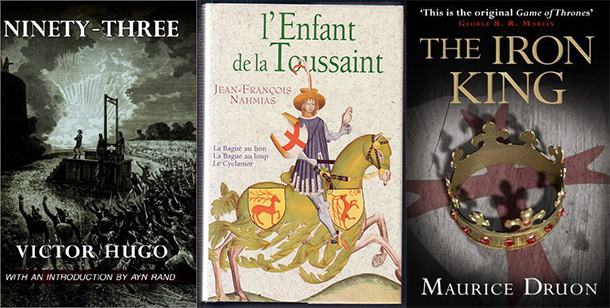
Some people can trace the stages of their life by the liquor they drink or the clothing style they adopt. Being very ecumenical when it comes to liquor, I prefer to trace the events of my life by the books I read. Turns out, almost every summer and every life event was symbolized by a distinct genre of books.
In the summer of 2006, my first summer in New York City, I read the L’Enfant de la Toussaint trilogy (in Russian translation) by French historic novelist Jean-Francois Nahmias of Sephardic descent. The trilogy traced the whole Hundred Years War through the life of a fictional French knight and alchemist who had the (mis?)fortune of being born on November 1, 1337, the day that the War broke out. (As you can guess, he died on the last day of the War at the age of one hundred). These 800-page volumes of battles, romance, and a fictionalized, yet accurate description of medieval France kept me company on the long subway rides that I took from my apartment in Brooklyn to see my future wife in Queens. That same summer, I read Victor Hugo’s Ninety-Three, a pro-Republican novel about the Vendee rebellion, which forever made me a devoted admirer of the Vendeans and the Chouans – surely not the outcome maitre Hugo anticipated.
In the summer of 2008, the time of my wedding and a week-long honeymoon to Prague (many of my half-literate peers did not know the city even existed), I read Maurice Druon’s The Accursed Kings (Les Rois Maudits). A series of eight novels, which with painstaking detail trace the turbulent lives and times of the last five direct Capetian kings and the first two from the house of Valois. The novels commence with Philip IV the Fair’s persecution and destruction of the Templars. The title of the series stems from the curse that the Templar Grand Master Jacques de Molay supposedly hurled at Philip IV and his descendants while being burned at the stake on the Île aux Juifs in the middle of the Seine.
Interestingly enough, Druon’s novels were extremely popular in the Soviet Union and remain so in post-communist Russia. Like many of his generation, Vladimir Putin was a fan of the novels and became friends with the famous French author who passed away in 2009 at the age of ninety. Being a rightwing intellectual, Druon expressed his support for Russia’s campaigns in Chechnya, which he characterized as “a center of international terrorism” and denounced French media for being prejudiced against Putin.
However, Maurice Druon’s work was virtually unknown in this country until about a year or so ago. The novelist George R. R. Martin, creator of the famous A Song of Ice and Fire series of novels, on which the hit HBO miniseries Game of Thrones is based, praised The Accursed Kings as an inspiration for his work. And all of the sudden, Druon’s novels were reissued with an introduction by Martin. But they will never be as popular here as in the old Soviet Union. First, the subject matter is too Christian, European, and historic for American readers. Second, to become popular in today’s America, a novel, especially, a historical one, must have a movie or a TV show, which is based on it.


Leave a Reply